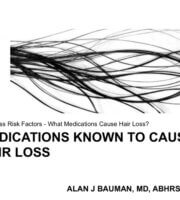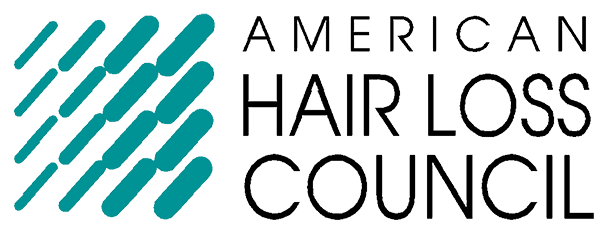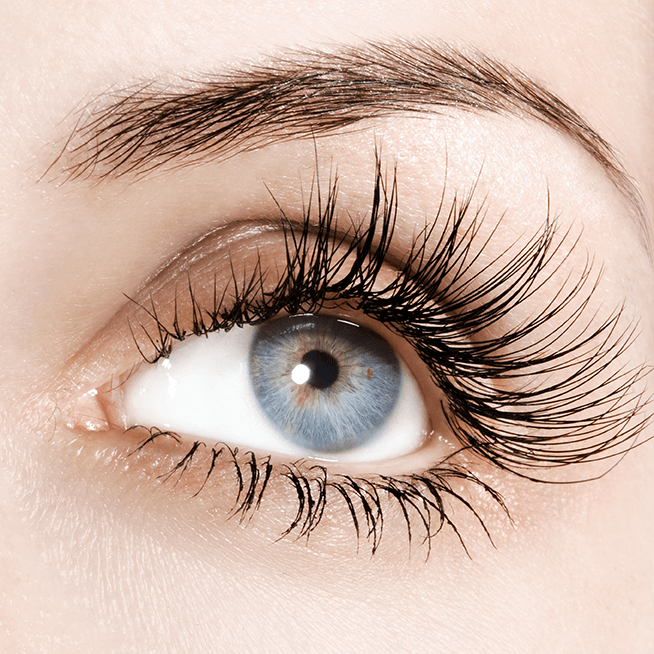Menopause and Hair Loss
Hello, it’s Dr. Bauman.
I’d like to take a moment to address a common, but seldom-discussed, symptom of menopause: hair loss.
After menopause, 4 in 10 women experience hair thinning, which is almost the same rate as men.
However, unlike men, female hair loss tends to be a lot subtler, and the early warning signs are often missed, or ignored.
Women often try to hide their hair loss in the early stages with hairstyle changes and cosmetic thickeners, which can lead to more serious problems down the road.
If left untreated, gradual female hair loss, like that seen during and after menopause, can result in a significant loss of coverage at the frontal area, crown, or temples.
Fortunately, there’s a whole range of effective treatment options available today that can prevent, control, and reverse the hair loss process during and after menopause.
In my experience with female patients, preventing further hair loss and improving hair growth can restore a feeling of vitality, youth, and confidence.
With that in mind, let’s look at five things you should know about menopause and hair loss:
1. Common Mistakes to Avoid
When it comes to hair loss, missing the early signs is one of the first mistakes many women make.
A staggering 50 percent loss can occur before it’s noticeable to the human eye. The other common mistake women (and men, for that matter) make when trying to treat their hair loss is not giving enough time for therapy to work and not tracking their results properly.
Just like hair loss, initial changes in hair regrowth take time and can be subtle before they are noticeable to the naked eye.
2. Role of Hormones
Just as high levels of female hormones during pregnancy leave women with fuller, healthier hair, the declining levels during menopause may have the opposite impact.
In addition, when the levels of female hormones fall, the effects of androgens (male hormones) can increase, causing certain hair follicles to fail.
Depending on your genetic risk, these follicles produce progressively weaker hair and then eventually none at all.
If your doctor has recommended replacing your declining testosterone levels, this also may work against your luscious locks as many aging women can experience increased hair loss from testosterone, especially if they are “androgen sensitive.”
3. Other Contributing Factors
When it comes to menopausal hair loss, lower female hormones might be the most common culprit, but other contributing factors may need to be considered as well.
These risk factors include genetic predisposition, unusual levels of stress, other hormonal imbalances — like thyroid, for example — nutritional or iron deficiencies, crash diets, as well as illness, medications and your surgical history.
A detailed medical history and diagnostic tests are obtained as an important part of a medical hair-loss evaluation to identify risk factors.
4. Hair Loss Is a Treatable Condition
Good news! You have more hair restoration treatments available today than ever before.
Medical treatments that will help mitigate hair loss include a specially compounded prescription minoxidil solution, platelet-rich plasma injections (PRP), low-level laser therapy, off-label finasteride (for post-menopausal women only) and nutritional supplements.
After more than 25 years of experience, I’ve found the best strategy is to use a multi-therapy approach and routine follow-ups for tracking purposes to see what’s working.
5. Hair Loss Can Have Psychological Effects
Studies have proven that hair loss can have wide-ranging psychological effects on women, including loss of confidence and self-esteem and in some cases, depression, anxiety, social withdrawal, and more.
Whether your hair loss is the result of natural hormonal changes or other underlying causes, in most cases hair loss is a treatable condition and not something you have to live with or hide.
If you’re worried about menopause-related hair loss, I invite you to join me in a private 1-on-1 consultation, available in-person or online.
During this consultation, we’ll uncover the root cause of your hair loss, clarify your hair health goals, and build a customized hair restoration plan for you.
Interested?
>> Go here to schedule your 1-on-1 consultation.
Or call us at 561-394-0024 with questions or to schedule by phone.
Remember: When it comes to your hair, “time is follicles.”
The sooner we can diagnose the root cause of your hair loss, the faster we can turn the situation around — and the more treatment options and therapies we’ll have available.
And if you’re already a patient but it’s been a while since you’ve seen us, that’s okay! We’re here to help you get back on your journey.
Schedule a follow-up consultation virtually or in-office and we’ll get you back on track.
Call us at 561-394-0024 to schedule your follow-up visit.
Sincerely,
Dr. Alan Bauman, MD, ABHRS, FISHRS
Diplomate, American Board of Hair Restoration Surgery
Fellow, International Society of Hair Restoration Surgery
intouch@baumanmedical.com
(561) 394-0024 – Work



 What I say to female patients who are losing hair
What I say to female patients who are losing hair What Medications Cause Hair Loss?
What Medications Cause Hair Loss? Dr. Alan J. Bauman, M.D.Hair Loss & Hair Transplant ExpertBoca Raton, FL
Dr. Alan J. Bauman, M.D.Hair Loss & Hair Transplant ExpertBoca Raton, FL






